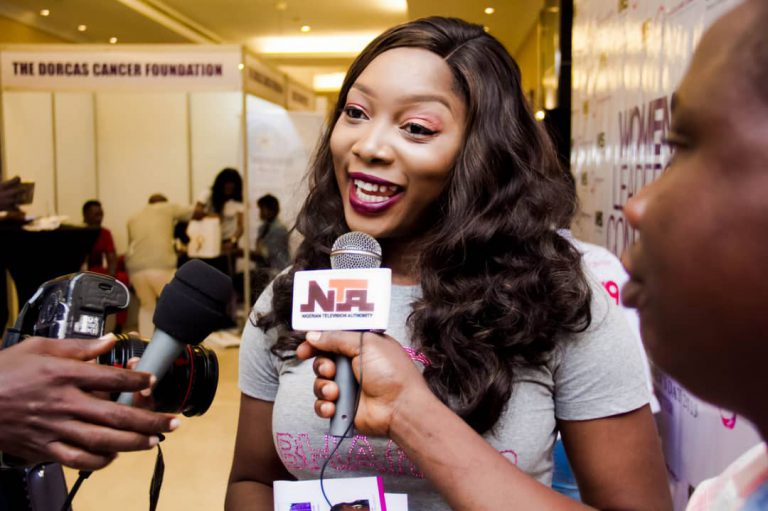Imagine a world where men and women are treated with respect and dignity, where everyone is free to make their own decisions and to live to their utmost potential, a world where everyone’s rights are fully protected. That is my dream and the foundation of what I do. I am Titilayo Ogunbambi, an equal rights advocate and founder of Boundless Hands Africa Initiative (BHA), a nonprofit championing gender equality, sexual and reproductive health, girls’ education, and human rights and working to eliminate domestic abuse. I also participated in the 2016 cohort of the Young African Leaders Initiative’s (YALI) West Africa Regional Leadership Center in Lagos, Nigeria.
I grew up in the beautiful city of Jos, and though my parents raised us girls and our brothers in the same way, all around me I heard stories about and witnessed firsthand the unequal way in which females were treated, particularly in relation to gender-based violence. At school, many boys bullied us; others beat hapless female students. Over the years, I continued to see around me pockets of domestic violence, harassment, and assaults directed at women, the majority of which were considered “socially acceptable.” I hated these acts of injustice and challenged many boys I saw mistreat girls, but it always seemed overwhelming. I continued to hear the pervasive rhetoric that “it is a man’s world,” “Stay out of their lane,” and so on.
In 2007, I lost a beloved aunt to intimate partner violence. She died from the injuries inflicted on her by her partner during a misunderstanding. That was the turning point of my career. I decided then that I was going to spend my life working against gender-based violence and all forms of human rights abuse.
In 2016, I registered BHA as a nonprofit, nongovernmental organization that would serve as an accessible regime for women experiencing violence. At the same time, I designed several interventions to promote human rights and dignity, promoting social and behavioral change and advocating for more inclusive policies. We combined a bottom-up as well as a top-down approach to advance and promote human rights and gender empowerment through our three key strategies, known as SAP:
SUPPORT: Providing all forms of support for victims of GBV, including counselling therapy, legal redress, and empowerment. Our aim is to create a home where the victims can stay until they are fully recovered and empowered to reintegrate into society.
ADVOCACY: To address GBV, advocate for equality, and promote positive masculinity, among other themes.
POLICY CHANGE: Through research and stakeholder engagement, we are promoting a culture that reports GBV, which we believe is the first step in getting victims the full support that they need, including, but not limited to, emergency medical examinations in case of rape, to prevent unwanted pregnancies and sexually transmitted infections (STI). This also serves as an avenue to secure legal redress and prosecute perpetrators of GBV. Over the years, I have been directly involved in advancing 78 GBV cases since 2016, over 50 of which were resolved. BHA has also provided support for 152 girls in local schools, in addition to empowering 22 women across Nigeria.
Participating in YALI’s West Africa Regional Leadership Center in Lagos helped me to structure my vision. It was there that I met good people who have become partners in my fight for progress.
In the years since, we have also been designing and implementing several programs to empower women, girls, and the wider community. For instance, we celebrated the International Day of the Girl Child in October with students from the Correctional Centre in Idi-Araba; girls who were homeless or victims of abuse. We organized for Liza Pavlakos, an international speaker, to share with the girls her journey of recovering from sexual harassment and homelessness. Just hearing her speech inspired the young girls to think beyond their past and envision a new future. We also organized a “Balancing for Better”–themed Women in Leadership Conference to celebrate International Women’s Day. The conference afforded about 400 young female leaders aged 18 to 35 the opportunity to be mentored by over 10 distinguished female leaders across various fields, and we were lucky to have the participation of women from the U.N. office in Abuja.
Our work stems from our belief in the fundamental value of the liberty and dignity of every human being. We are moved by the prevalence of injustice, especially toward women and children. As part of the larger value chain tackling development issues across the globe, we believe that by bringing to the fore the plight of women and girls and by advocating for a world where everyone is free to pursue his or her goals and lead a better life, we are creating a just, happy, and fulfilling world for all.
The views and opinions expressed here belong to the author and do not necessarily reflect those of the YALI Network or the U.S. government. YALI Voices is a series of podcasts, videos and blogs contributed by members of the YALI Network.

